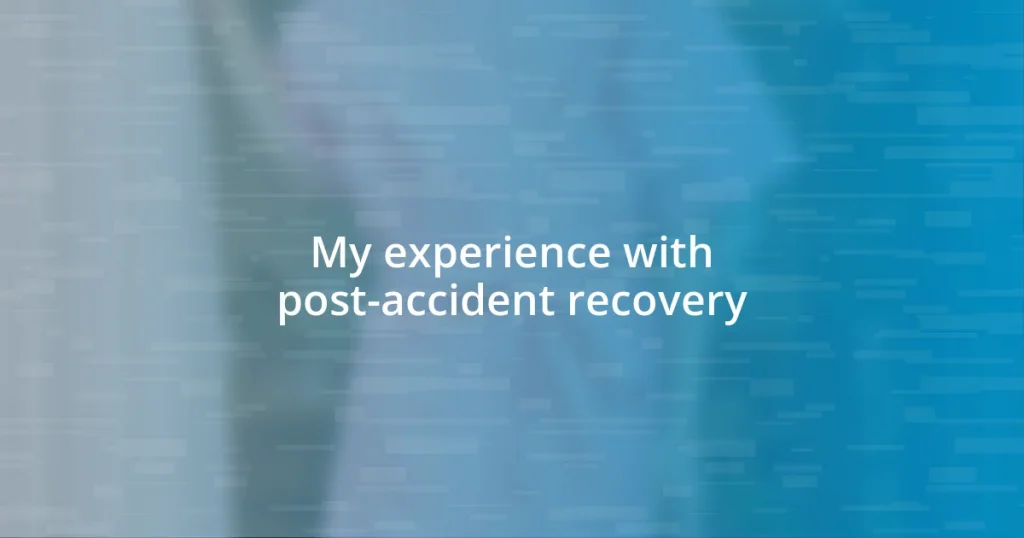Key takeaways:
- Post-accident recovery involves both physical healing and emotional processing, requiring patience and support from loved ones.
- A structured recovery plan, including medical attention and physical therapy, is essential for regaining strength and confidence.
- Setting realistic, small recovery goals while nurturing mental health and nutrition contributes significantly to the healing journey.
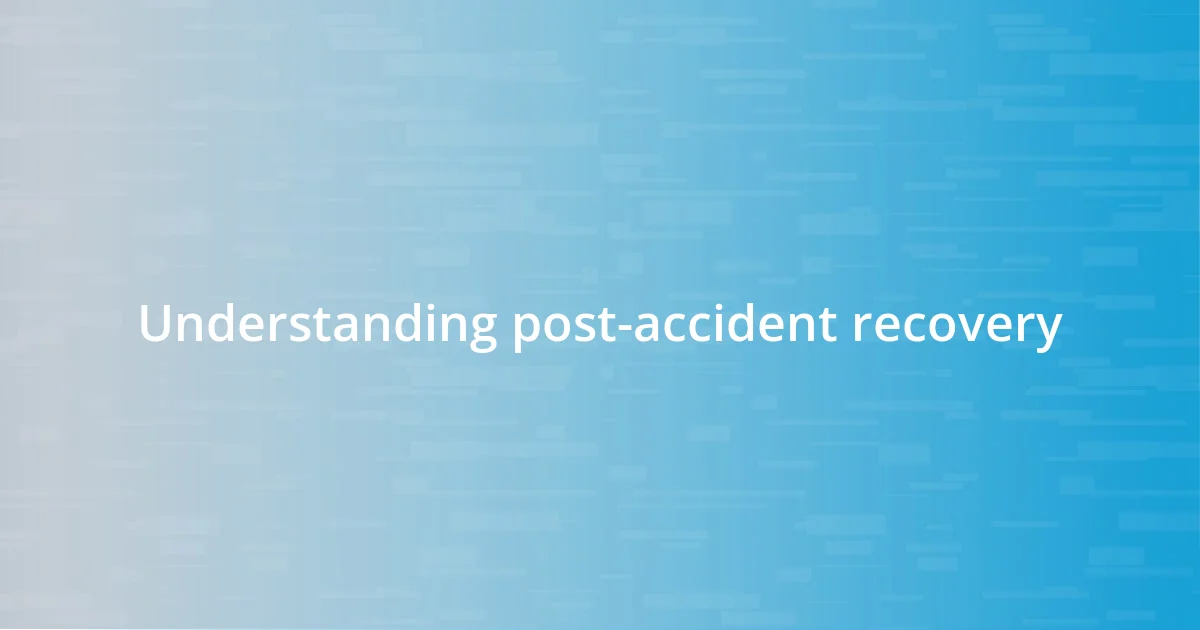
Understanding post-accident recovery
Understanding the process of post-accident recovery can feel overwhelming. I remember the moment I realized how much time and effort it would entail—sitting in the rehabilitation center, surrounded by people with similar stories, made me realize we were all on a journey to piece our lives back together. Have you ever felt lost after a life-changing event? That initial feeling of vulnerability can be intense.
Recovery isn’t just about the physical healing; it’s about the emotional journey as well. I found that my mental health often lagged behind my physical progress. It’s crucial to recognize that feelings of anger, frustration, and even sadness are normal. There were days when I questioned whether I’d ever be “me” again, and I learned the importance of patience—not just with my body, but also with my mind.
Moreover, the support system around you plays a vital role in the recovery process. I leaned heavily on my family and friends, who reminded me that it was okay to seek help. Have you had someone in your life who became a beacon of support during tough times? Their encouragement was sometimes the push I needed to take the next step in my recovery journey.
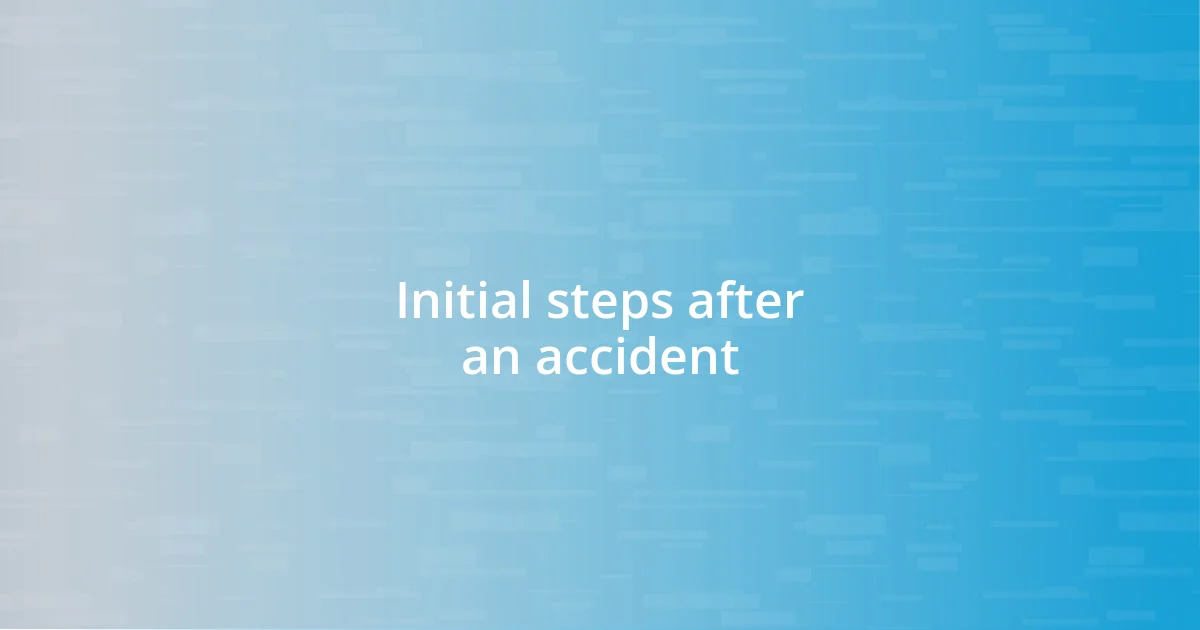
Initial steps after an accident
After an accident, one of the first things I realized was the importance of assessing both my physical and mental state. It’s easy to focus solely on injuries, but I learned that acknowledging my emotional response was equally crucial. In those early moments, I felt a whirlwind of emotions, from numbness to sheer panic. Have you ever felt disoriented after a shocking experience? I did, and it took me some time to ground myself in reality.
The first step I took was to seek medical attention. I vividly remember the sterile smells and the hurried voices in the emergency room. Getting a thorough examination was essential not just for physical healing, but also to alleviate my mind about potential long-term consequences. This initial visit set the stage for all the subsequent steps in my recovery journey. I can’t tell you how reassuring it was to hear the doctors explain the treatment plan. Everyone deserves that clarity when facing uncertainty.
Additionally, creating a recovery plan was invaluable. I took time to jot down my goals, both short-term and long-term. It helped me visualize the path ahead. Sharing these goals with my support system encouraged them to check in and keep me accountable. Have you ever felt lost without a roadmap? For me, this act of planning provided a sense of direction when everything else felt chaotic.
| Initial Steps | Description |
|---|---|
| 1. Assess Your State | Evaluate both physical and emotional health to understand the impact of the accident. |
| 2. Seek Medical Attention | Get a thorough medical examination to identify injuries and establish a treatment plan. |
| 3. Create a Recovery Plan | Write down goals for recovery and share them with your support system for accountability. |
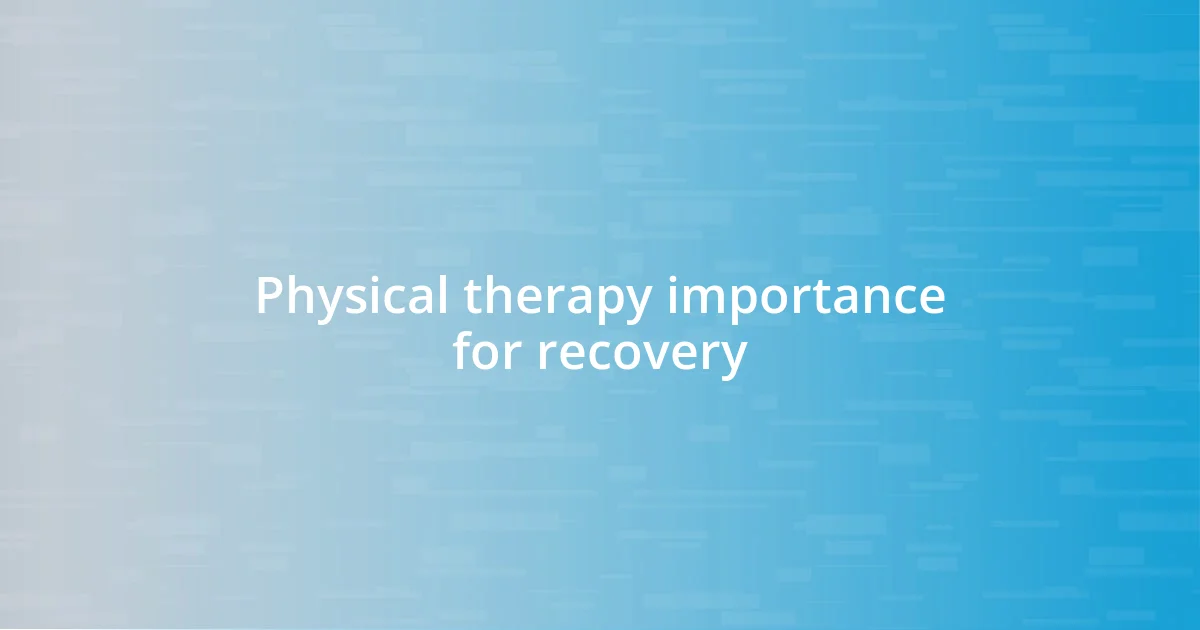
Physical therapy importance for recovery
Physical therapy was a game-changer in my recovery journey. I still recall the first session; I felt a mixture of excitement and apprehension. It was a pivotal moment that made me realize my body could heal with the right guidance. Physical therapists not only helped me regain strength and mobility but also educated me about my injuries. Having someone by my side who understood my struggles made a world of difference.
Here are just a few reasons why physical therapy is vital after an accident:
- Personalized Treatment Plans: Each person’s recovery is unique, and therapists tailor exercises to my specific needs.
- Pain Management: Specific techniques helped me manage discomfort effectively, reducing reliance on medications.
- Increased Motivation: The encouraging environment kept me pushing through, knowing that every little achievement mattered.
- Long-term Benefits: I learned preventative strategies that shaped my approach to physical health moving forward.
Getting into a consistent therapy routine established a rhythm in my recovery. I grew to look forward to those sessions—not just for the progress I was making but for the invaluable support and understanding I found there. There were days when I felt discouraged, but my therapist’s words often echoed in my mind: “You’re stronger than you think.” That little reminder became my anchor during tough times.
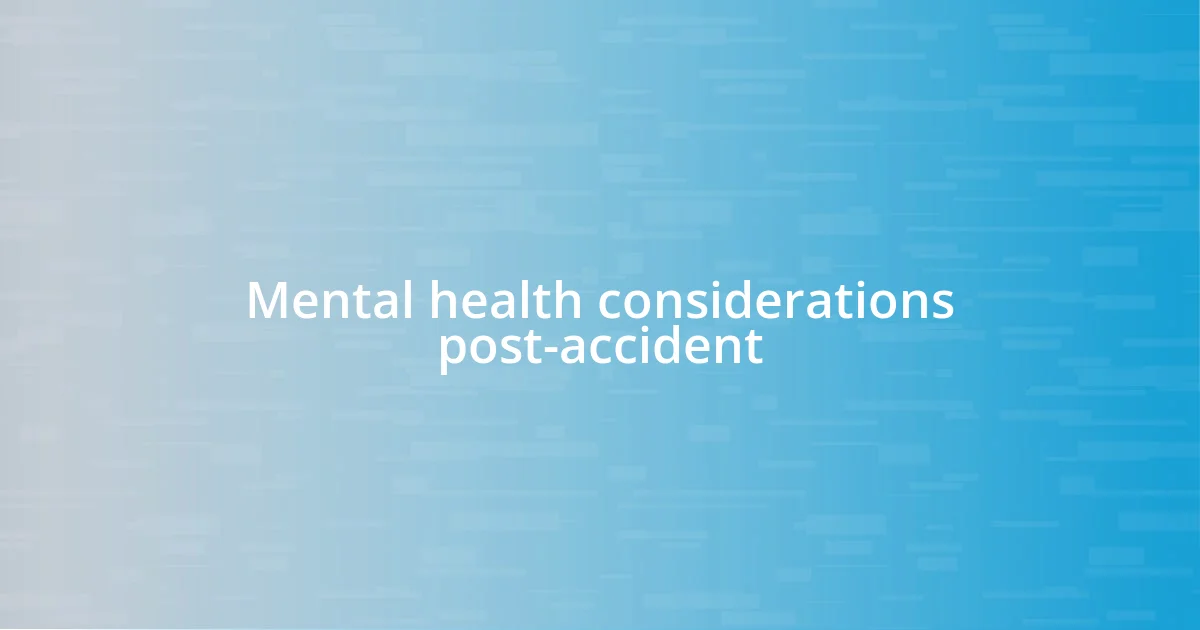
Mental health considerations post-accident
Mental health considerations post-accident are often overlooked, yet they are just as vital as physical recovery. I remember feeling overwhelmed by anxiety in the days following my accident. Have you ever experienced that feeling where your thoughts race, and it’s hard to catch your breath? I found myself constantly replaying the incident in my mind, which only fueled my stress. It became apparent to me that I needed to talk about it—so I reached out to a therapist. Sharing my feelings helped me process the emotional aftermath in a way that felt both validating and liberating.
As time went on, I discovered the power of mindfulness and grounding techniques. Simple practices, like taking deep breaths or going for a walk in nature, were instrumental in managing my racing thoughts. I often asked myself, “What can I do right now to feel more centered?” This shift in focus allowed me to reclaim a sense of control amidst the chaos. Although it might sound cliché, those quiet moments truly became my sanctuary, helping me navigate the fluctuating tide of emotions during my recovery.
Additionally, I learned how important it is to lean on my support network. Friends and family became my lifeline, providing a safe space where I could express my fears without judgment. There’s something reassuring about knowing you’re not alone in such a tumultuous time. Have you ever felt the warmth of genuine support when you needed it most? I loved how sharing my experience not only lightened my emotional load but also deepened my connections with those around me. Engaging in conversations about my mental health helped me feel understood, and ultimately, strengthened my resolve to heal.
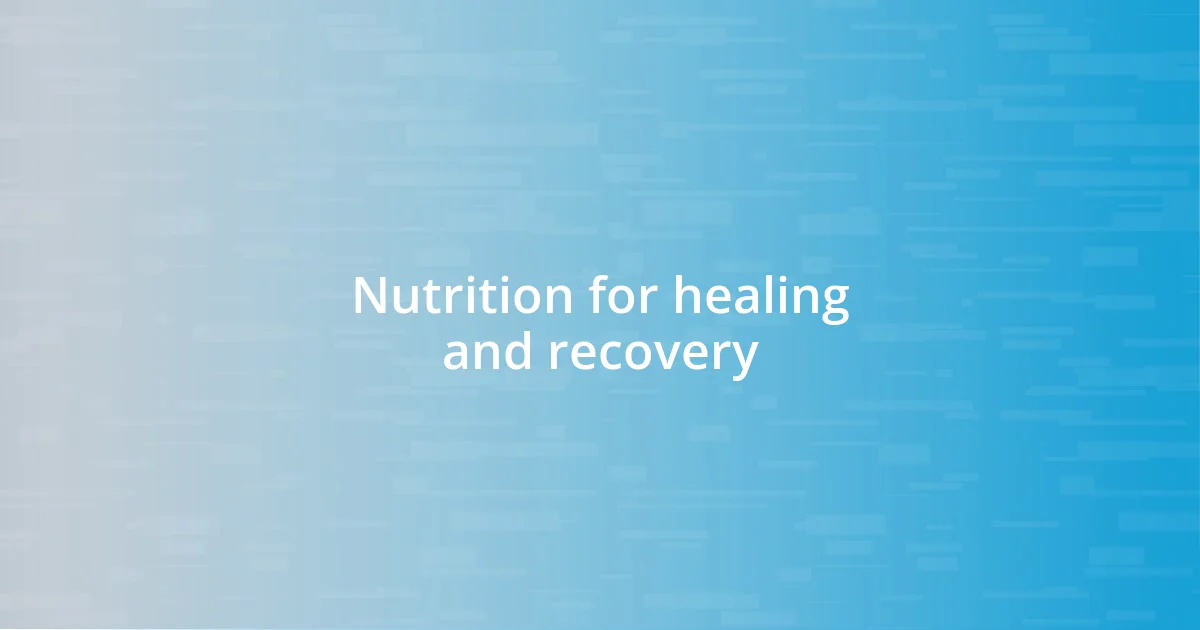
Nutrition for healing and recovery
Nutrition played a crucial role during my healing journey after the accident. I vividly remember consulting with a nutritionist who emphasized the importance of nutrient-rich foods. Protein was particularly vital for rebuilding muscle and repairing tissue. Did you know that food can act like medicine? I found that incorporating lean meats, legumes, and nuts made a noticeable difference in my energy levels and overall recovery.
I also came to appreciate the role of hydration in the healing process. After my accident, I was often tired and sluggish, which initially worried me. I learned that drinking enough water helped combat fatigue and keep my body functioning optimally. Have you ever noticed how even a little dehydration can zap your energy? Adopting the habit of sipping water throughout the day felt empowering and significantly improved my physical condition.
Moreover, the added benefits of vitamins and minerals can’t be stressed enough. For example, I learned that foods rich in vitamin C—like oranges and bell peppers—not only boosted my immune system but also improved my skin health as it healed from cuts and bruises. I often asked myself, “Am I nourishing my body adequately?” and I found that taking the time to prepare wholesome meals helped create a positive mindset, reinforcing my commitment to healing. Cooking became a therapeutic ritual, transforming what could have been just a chore into a meaningful part of my recovery.
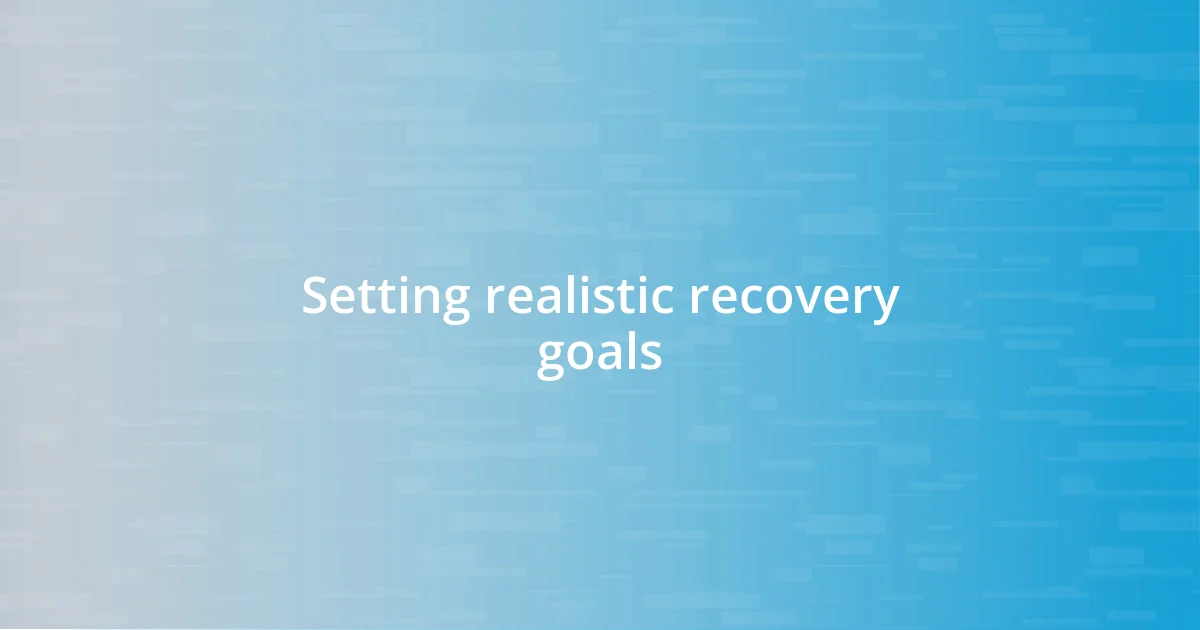
Setting realistic recovery goals
Setting realistic recovery goals is essential to navigate the path to healing effectively. Early in my recovery, I was eager to jump back into my daily routine, but I quickly learned that doing too much too soon often led to setbacks. Have you ever felt that rush of determination, only to find it was a bit too ambitious? I remember setting a goal to exercise again within just a few weeks and found myself frustrated when my body wasn’t ready. It was a humbling moment that taught me to recognize my limits and adjust my expectations accordingly.
I found that breaking down my recovery into smaller, manageable milestones made a world of difference. Instead of focusing solely on getting back to work or physical activities, I began celebrating tiny victories—like being able to walk around the block without feeling exhausted. Each small success felt like a step forward, gradually building my confidence. Have you ever noticed how celebrating little achievements can empower you on your journey? I realized that these micro-goals not only kept me motivated but also made the entire process feel more attainable.
Connecting with others who had been through similar experiences was invaluable too. Hearing their stories reinforced the idea that recovery isn’t a straight line; it’s a winding path with ups and downs. I remember talking to a friend about their recovery process and realizing that they had setbacks, just like I did. It made me reconsider the narrative I held in my mind—that I needed to be perfect in my recovery. Instead, I found solace in knowing that patience and gradual progress were key. How liberating is it to embrace the concept that healing is a journey, not a race?











